Abstract
RC-12 [1,2-dimethoxy-4-(bis-diethylaminoethyl)-amino-5-bromobenzene] was evaluated for prophylactic, radical curative, and suppressive activities against infections with Plasmodium cynomolgi and subacute toxicity in rhesus monkeys. Applied as a prophylactic agent, RC-12, administered in doses of 6.25 to 25.0 mg/kg daily throughout the incubation period, provided near-complete to complete protection against 10(5) to 10(6) times the minimum infective dose of sporozoites. Applied as a suppressive agent, daily doses of 100.0 mg of RC-12 per kg did not eradicate blood schizonts regularly; hence, the need for concomitant administration of a blood schizonticide, such as chloroquine, in assessments of radical curative activity. In such appraisals, daily doses of 6.25 to 25.0 mg of RC-12 per kg for 14 days, in combination with 2.5 mg of chloroquine per kg daily for 7 days, effected cure of 69 and 93% of established infections, respectively. The curative activity of RC-12 was related to the total dose and could be achieved with a regimen as brief as 4 days. With respect to outward expressions of toxicity, daily doses of 50.0 mg/kg or lower for 15 to 225 days evoked no reactions. Doses of 100.0 or 200.0 mg/kg, scheduled for 15 days, evoked convulsions and depression and were, respectively, lethal to 4 of 17 and 7 of 7 recipients. Doses of 25.0 mg/kg or lower evoked no discrete reactions. Doses of 50.0 mg/kg and higher evoked hepatomegaly, vacuolation of hepatocytes, and elevations of glutamic oxalacetic and glutamic pyruvic transferase activities in serum, reactions related in intensity to dose but not duration of dosage.
Full text
PDF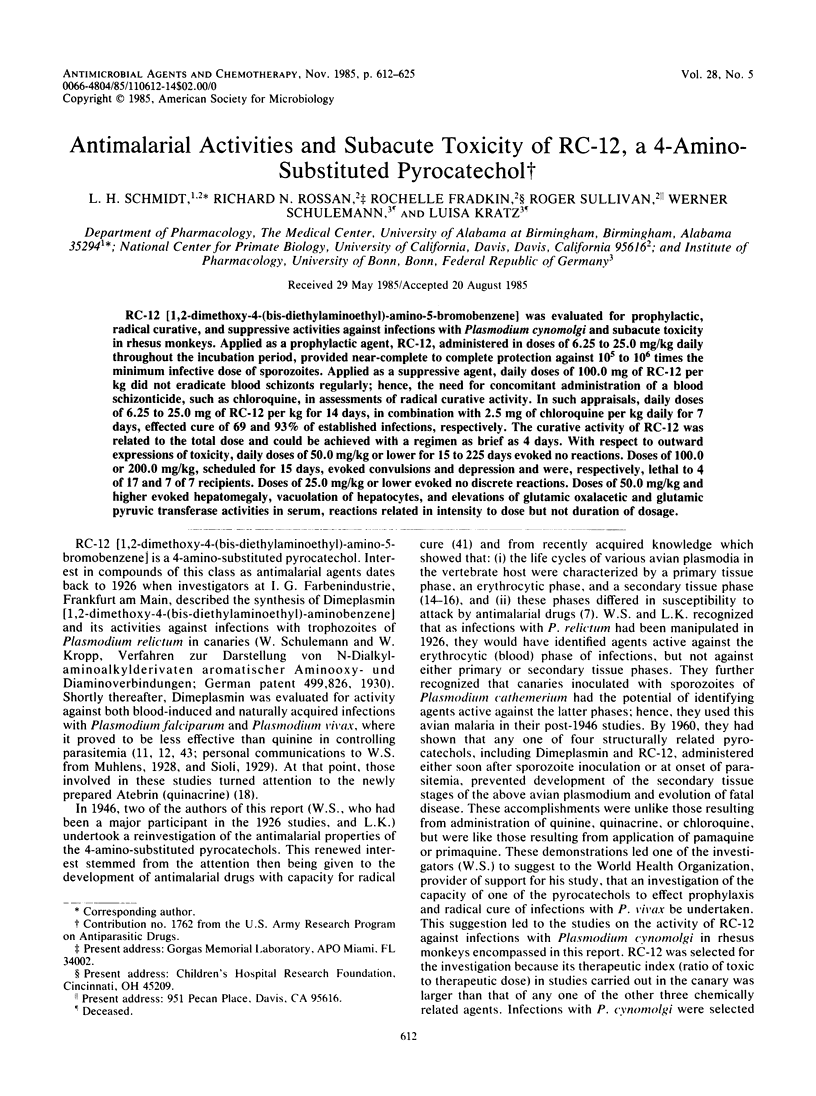
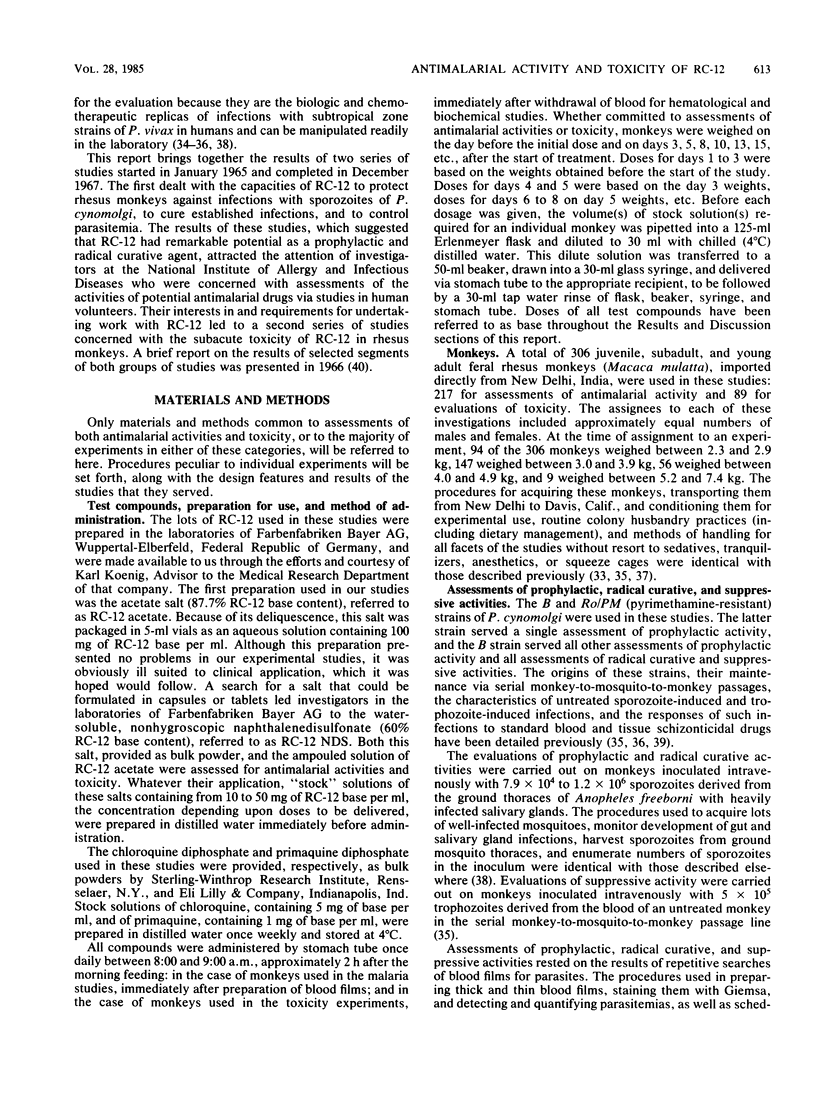
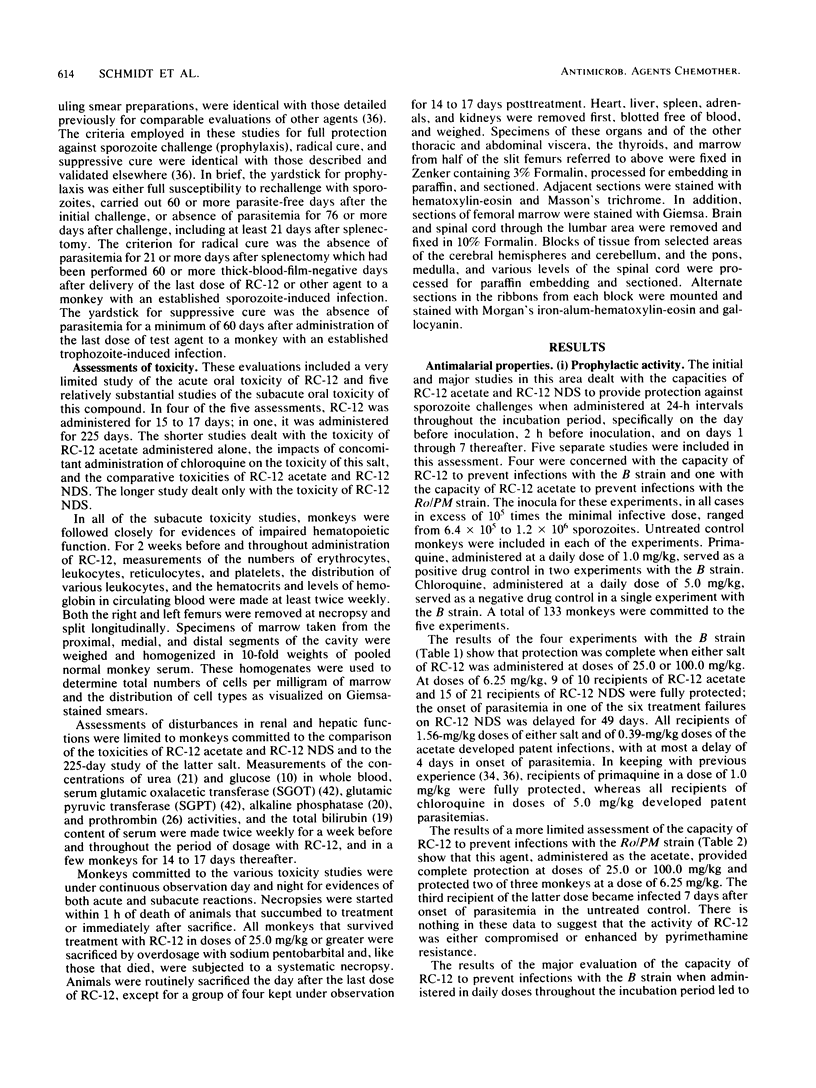
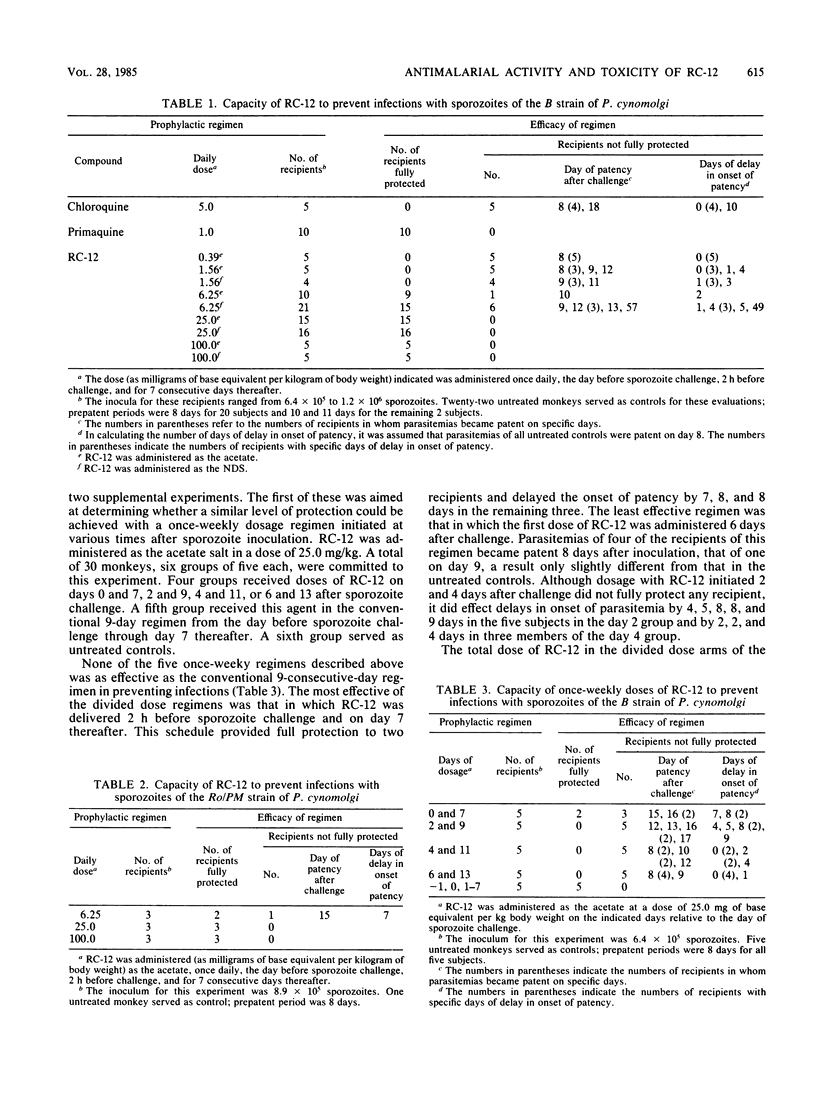
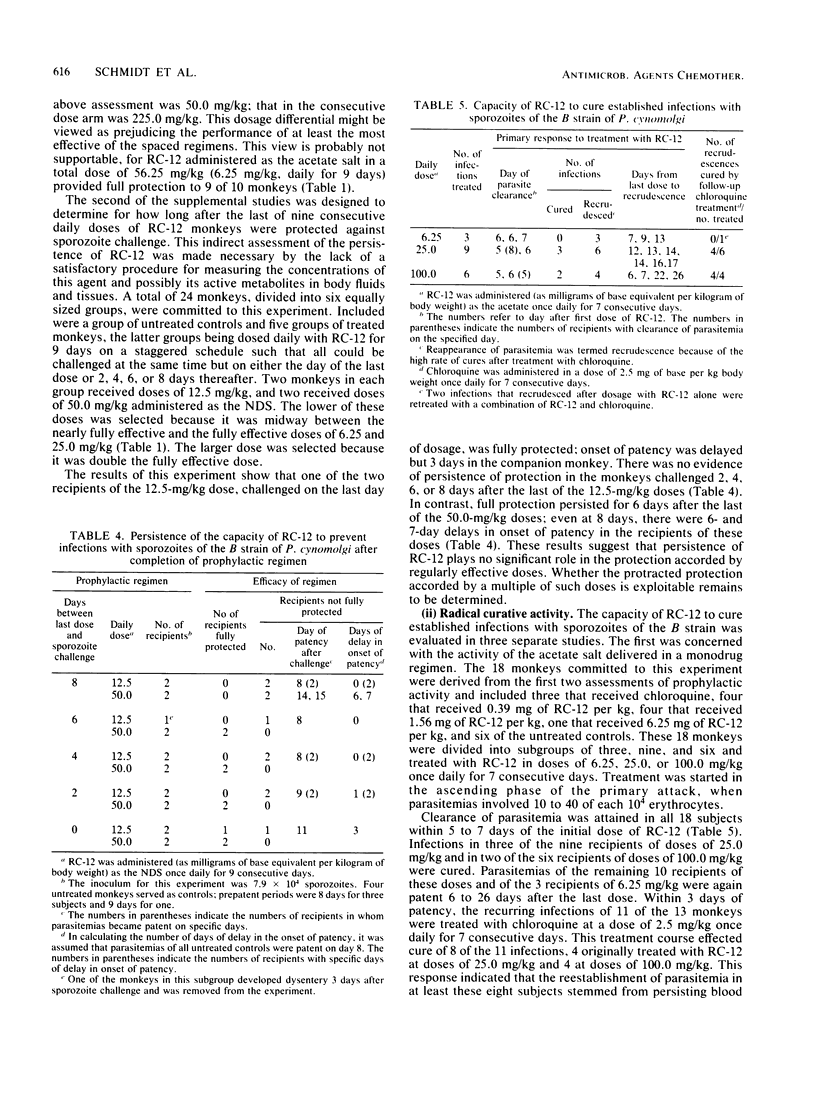
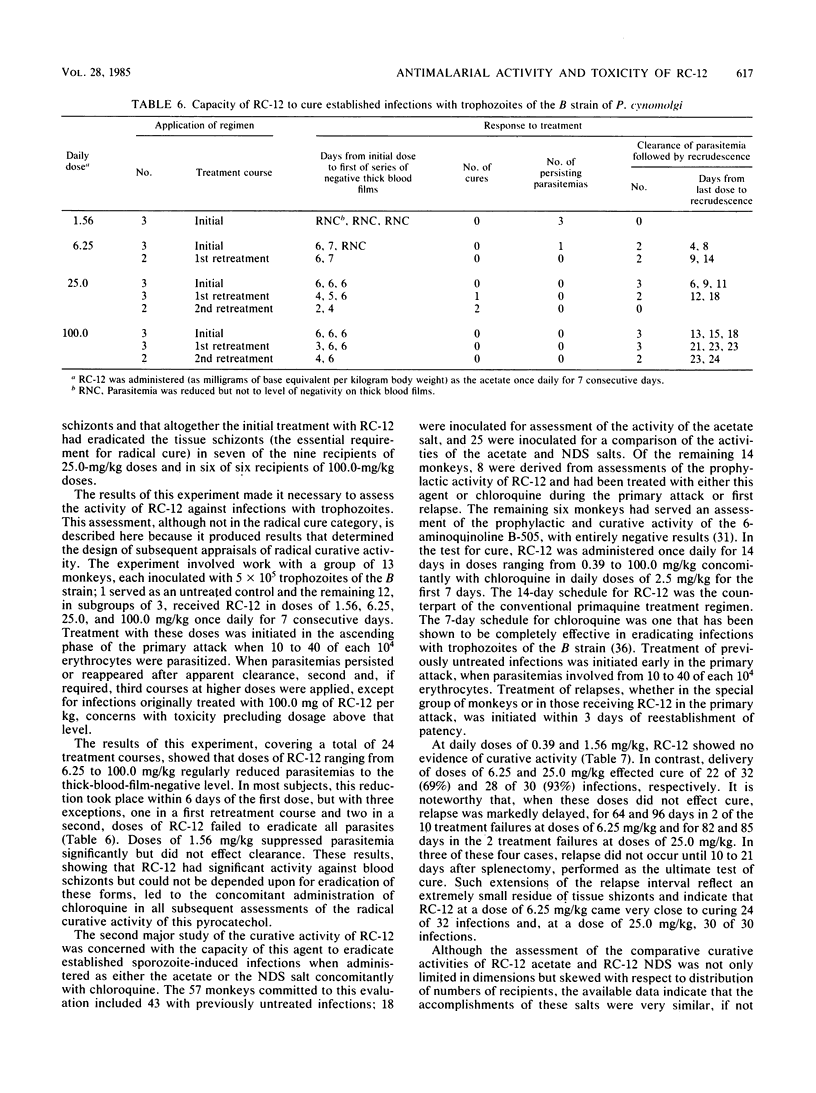
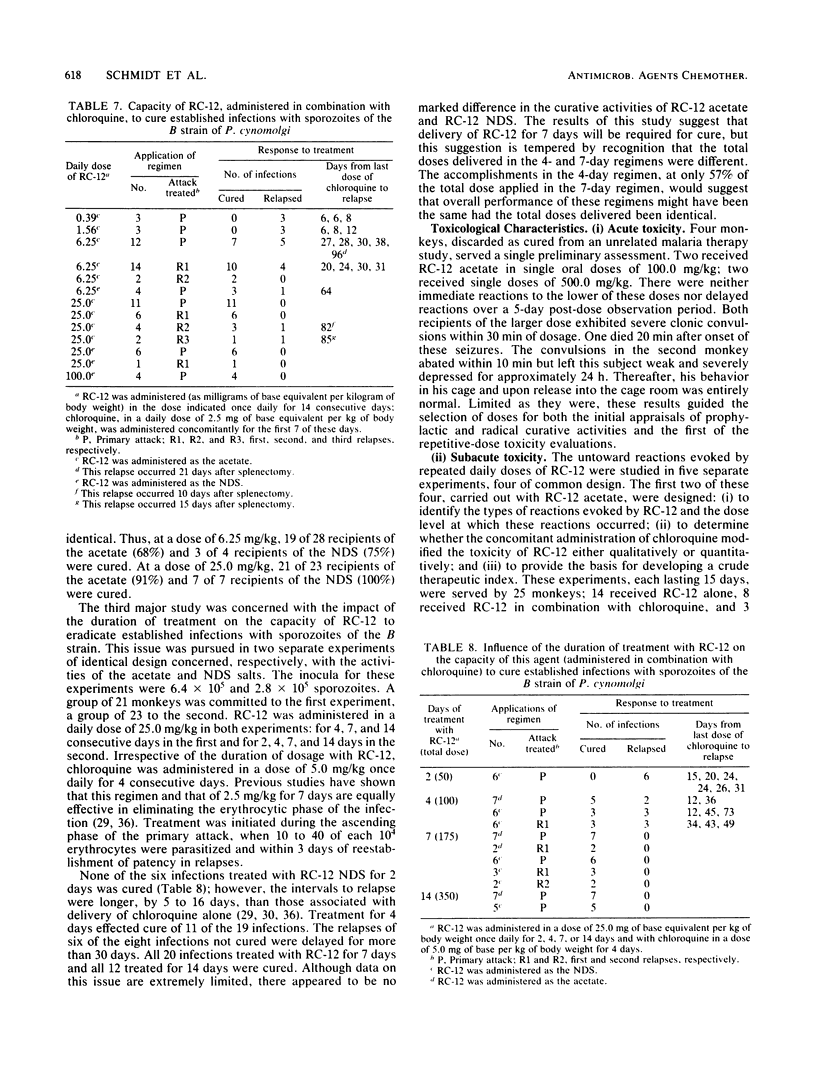
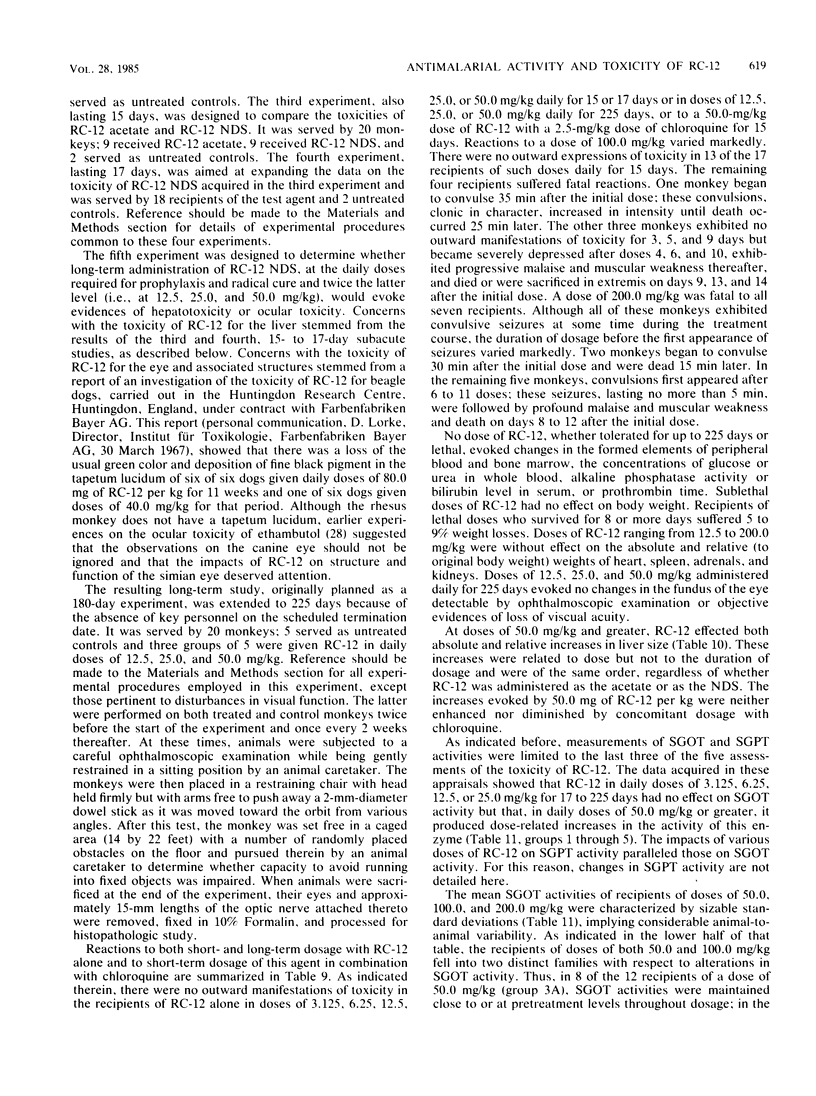
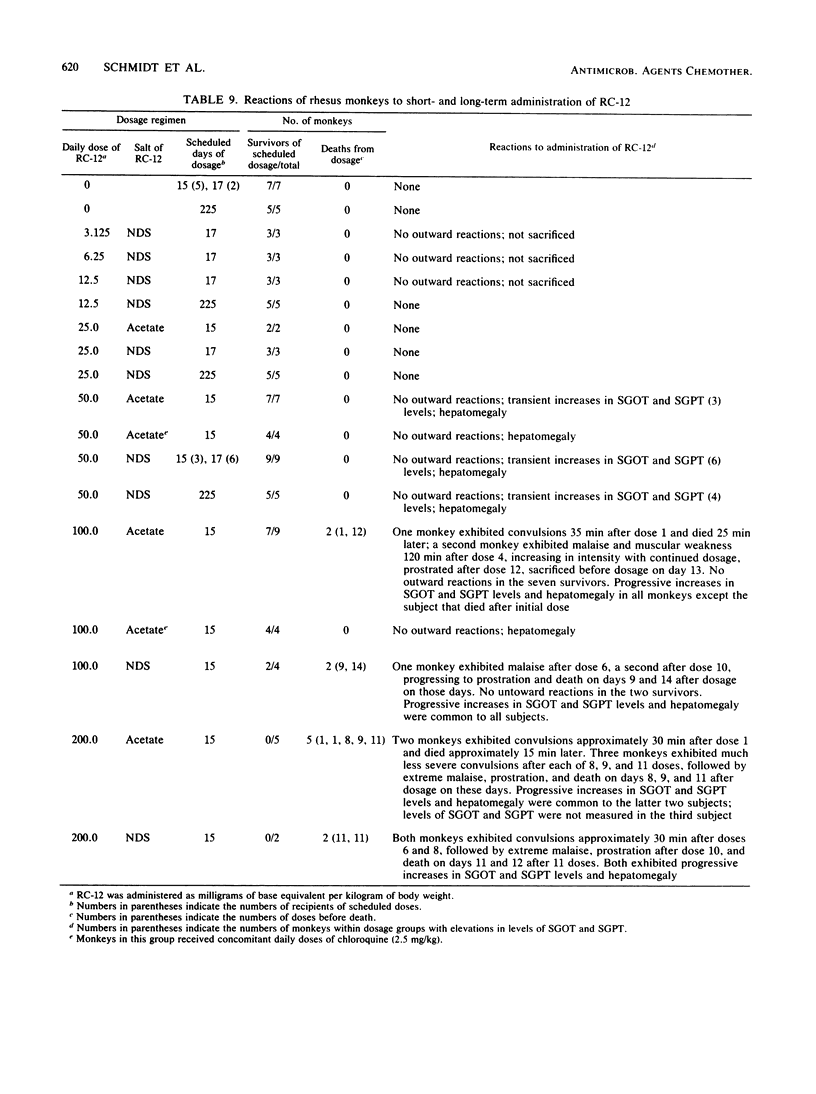
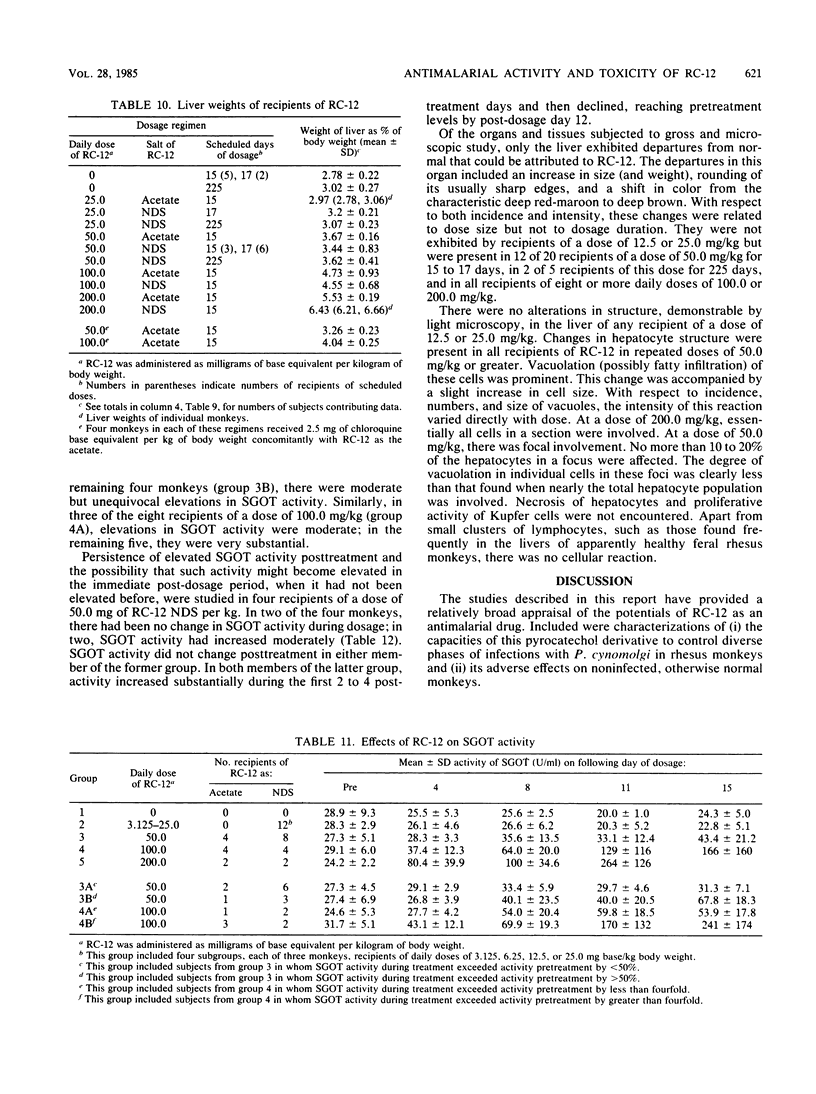
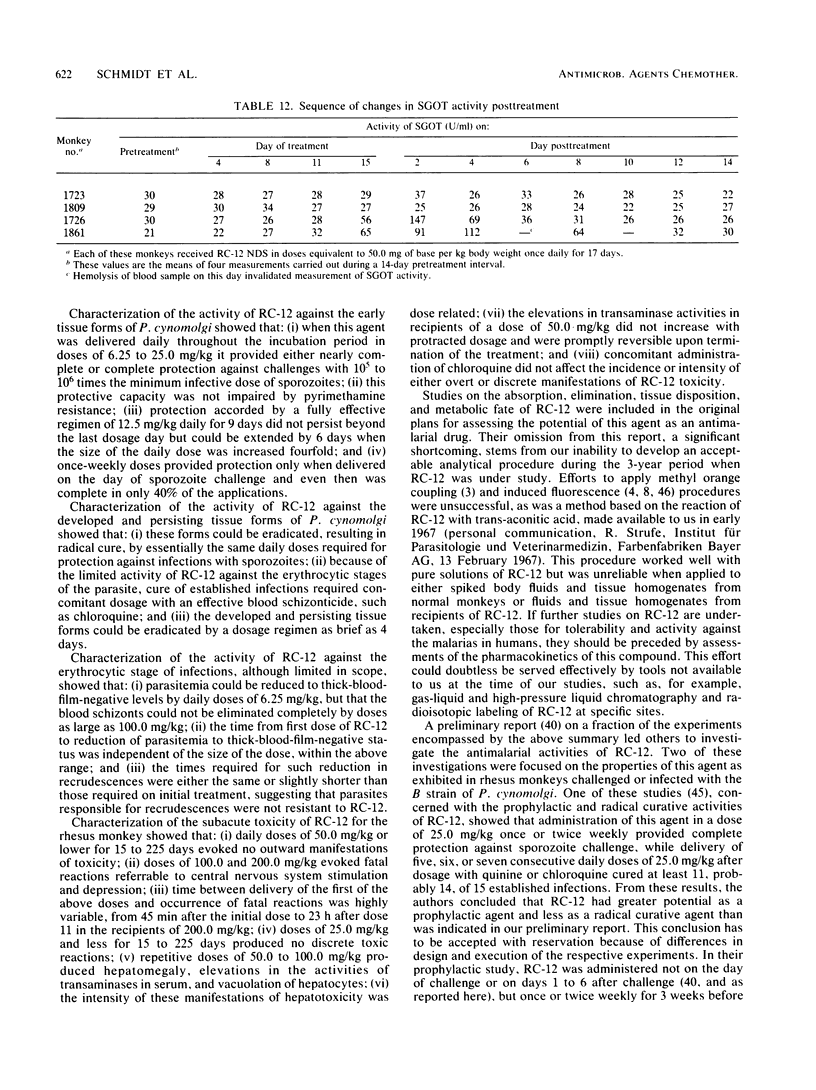
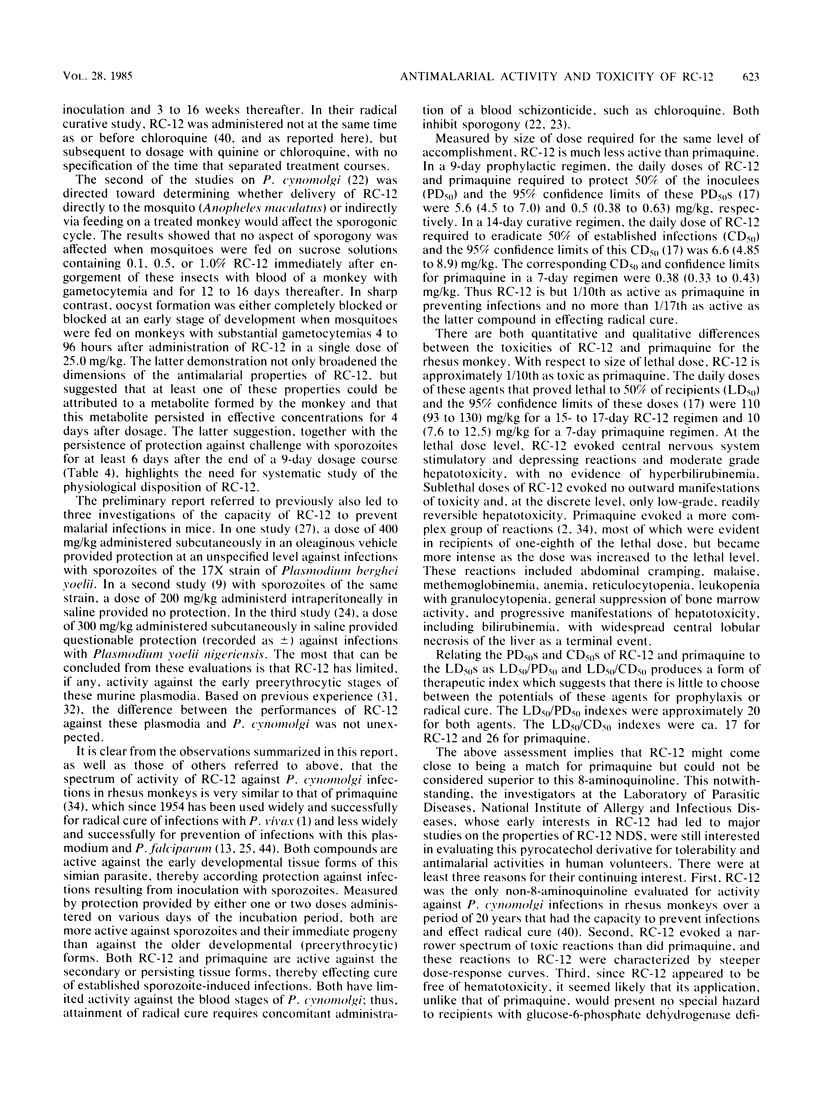
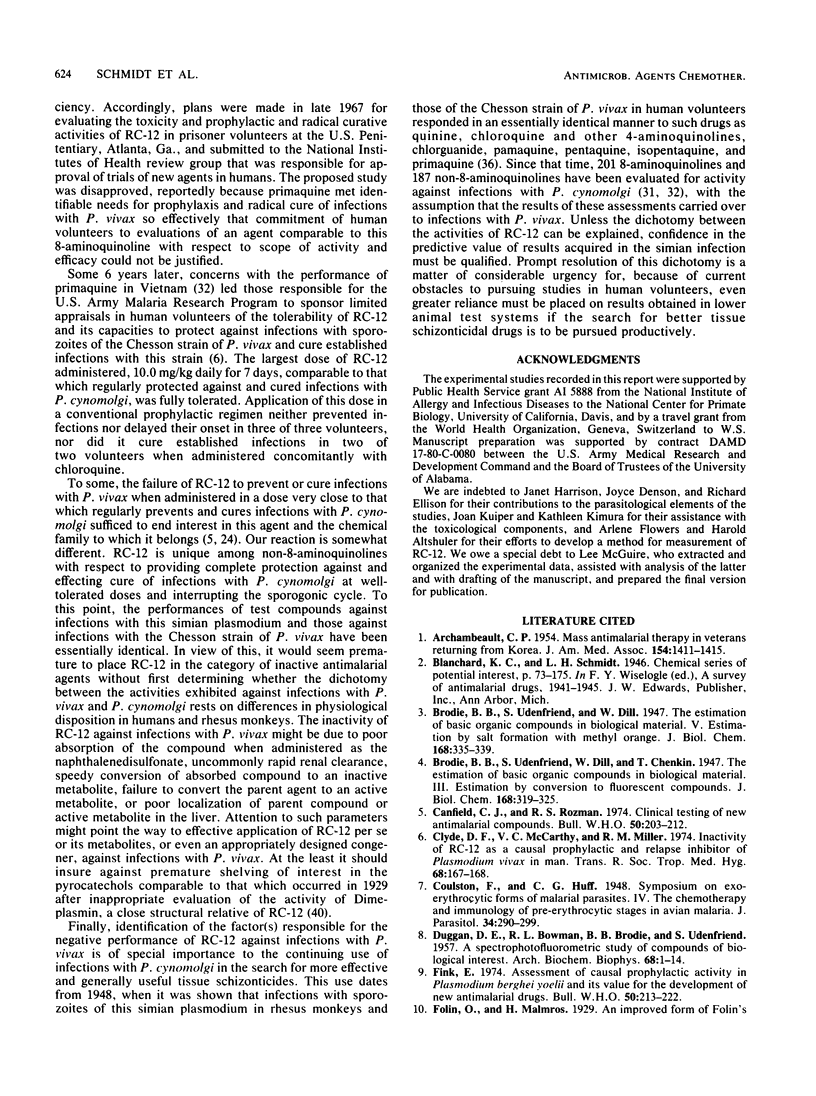
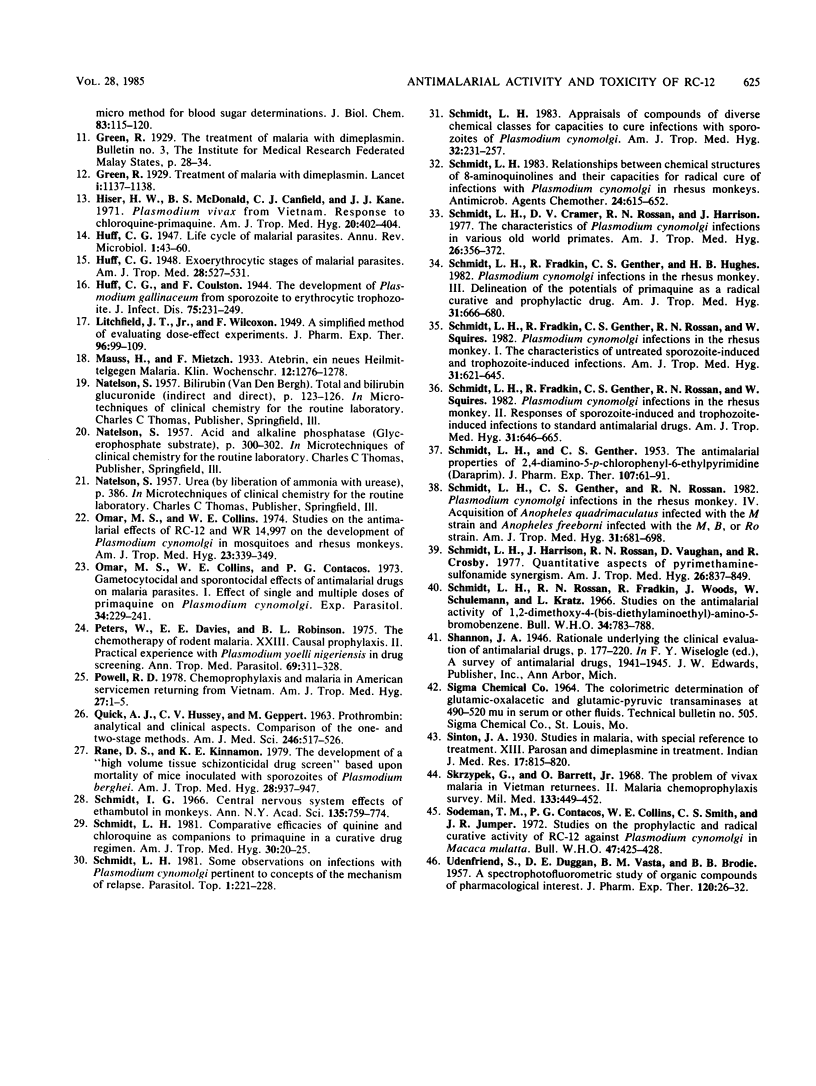
Selected References
These references are in PubMed. This may not be the complete list of references from this article.
- ARCHAMBEAULT C. P. Mass antimalarial therapy in veterans returning from Korea. J Am Med Assoc. 1954 Apr 24;154(17):1411–1415. doi: 10.1001/jama.1954.02940510011005. [DOI] [PubMed] [Google Scholar]
- Canfield C. J., Rozman R. S. Clinical testing of new antimalarial compounds. Bull World Health Organ. 1974;50(3-4):203–212. [PMC free article] [PubMed] [Google Scholar]
- DUGGAN D. E., BOWMAN R. L., BRODIE B. B., UDENFRIEND S. A spectrophotofluorometric study of compounds of biological interest. Arch Biochem Biophys. 1957 May;68(1):1–14. doi: 10.1016/0003-9861(57)90320-x. [DOI] [PubMed] [Google Scholar]
- Fink E. Assessment of causal prophylactic activity in Plasmodium berghei yoelii and its value for the development of new antimalarial drugs. Bull World Health Organ. 1974;50(3-4):213–222. [PMC free article] [PubMed] [Google Scholar]
- Hiser W. H., MacDonald B. S., Canfield C. J., Kane J. J. Plasmodium vivax from Vietnam. Response to chloroquine-primaquine. Am J Trop Med Hyg. 1971 May;20(3):402–404. doi: 10.4269/ajtmh.1971.20.402. [DOI] [PubMed] [Google Scholar]
- Omar M. S., Collins W. E., Contacos P. G. Gametocytocidal and sporontocidal effects of antimalarial drugs on malaria parasites. I. Effect of single and multiple doses of primaquine on Plasmodium cynomolgi. Exp Parasitol. 1973 Oct;34(2):229–241. doi: 10.1016/0014-4894(73)90082-9. [DOI] [PubMed] [Google Scholar]
- Omar M. S., Collins W. E. Studies on the antimalarial effects of RC-12 and WR 14,997 on the development of Plasmodium cynomolgi in mosquitoes and Rhesus monkeys. Am J Trop Med Hyg. 1974 May;23(3):339–349. doi: 10.4269/ajtmh.1974.23.339. [DOI] [PubMed] [Google Scholar]
- Peters W., Davies E. E., Robinson B. L. The chemotherapy of rodent malaria, XXIII Causal prophylaxis, part II: Practical experience with Plasmodium yoelii nigeriensis in drug screening. Ann Trop Med Parasitol. 1975 Sep;69(3):311–328. [PubMed] [Google Scholar]
- Powell R. D. Chemoprophylaxis and malaria in American servicemen returning from Vietnam. Am J Trop Med Hyg. 1978 Jan;27(1 Pt 1):1–5. [PubMed] [Google Scholar]
- QUICK A. J., HUSSEY C. V., GEPPERT M. PROTHROMBIN: ANALYTICAL AND CLINICAL ASPECTS. COMPARISON OF THE ONE- AND TWO-STAGE METHODS. Am J Med Sci. 1963 Nov;246:517–526. [PubMed] [Google Scholar]
- Rane D. S., Kinnamon K. E. The development of a "high volume tissue schizonticidal drug screen" based upon mortality of mice inoculated with sporozoites of Plasmodium berghei. Am J Trop Med Hyg. 1979 Nov;28(6):937–947. doi: 10.4269/ajtmh.1979.28.937. [DOI] [PubMed] [Google Scholar]
- SCHMIDT L. H., GENTHER C. S. The antimalarial properties of 2, 4-diamino-5-p-chlorophenyl-6-ethylpyrimidine, daraprim. J Pharmacol Exp Ther. 1953 Jan;107(1):61–91. [PubMed] [Google Scholar]
- Schmidt I. G. Central nervous system effects of ethambutol in monkeys. Ann N Y Acad Sci. 1966 Apr 20;135(2):759–774. doi: 10.1111/j.1749-6632.1966.tb45521.x. [DOI] [PubMed] [Google Scholar]
- Schmidt L. H. Appraisals of compounds of diverse chemical classes for capacities to cure infections with sporozoites of Plasmodium cynomolgi. Am J Trop Med Hyg. 1983 Mar;32(2):231–257. doi: 10.4269/ajtmh.1983.32.231. [DOI] [PubMed] [Google Scholar]
- Schmidt L. H. Comparative efficacies of quinine and chloroquine as companions to primaquine in a curative drug regimen. Am J Trop Med Hyg. 1981 Jan;30(1):20–25. doi: 10.4269/ajtmh.1981.30.20. [DOI] [PubMed] [Google Scholar]
- Schmidt L. H., Cramer D. V., Rossan R. N., Harrison J. The characteristics of Plasmodium cynomolgi infections in various old world primates. Am J Trop Med Hyg. 1977 May;26(3):356–372. doi: 10.4269/ajtmh.1977.26.356. [DOI] [PubMed] [Google Scholar]
- Schmidt L. H., Harrison J., Rossan R. N., Vaughan D., Crosby R. Quantitative aspects of pyrimethamine-sulfonamide synergism. Am J Trop Med Hyg. 1977 Sep;26(5 Pt 1):837–849. doi: 10.4269/ajtmh.1977.26.837. [DOI] [PubMed] [Google Scholar]
- Schmidt L. H. Relationships between chemical structures of 8-aminoquinolines and their capacities for radical cure of infections with Plasmodium cynomolgi in rhesus monkeys. Antimicrob Agents Chemother. 1983 Nov;24(5):615–652. doi: 10.1128/aac.24.5.615. [DOI] [PMC free article] [PubMed] [Google Scholar]
- Schmidt L. H., Rossan R. N., Fradkin R., Woods J., Schulemann W., Kratz L. Studies on the antimalarial activity of 1,2-dimethoxy-4-(bis-diethylaminoethyl)-amino-5-bromobenzene. Bull World Health Organ. 1966;34(5):783–788. [PMC free article] [PubMed] [Google Scholar]
- Skrzypek G., Barrett O., Jr The problem of vivax malaria in Vietnam returnees. II. Malaria chemoprophylaxis survey. Mil Med. 1968 Jun;133(6):449–452. [PubMed] [Google Scholar]
- Sodeman T. M., Contacos P. G., Collins W. E., Smith C. S., Jumper J. R. Studies on the prophylactic and radical curative activity of RC-12 against Plasmodium cynomolgi in Macaca mulatta. Bull World Health Organ. 1972;47(3):425–428. [PMC free article] [PubMed] [Google Scholar]
- UDENFRIEND S., DUGGAN D. E., VASTA B. M., BRODIE B. B. A spectrophotofluorometric study of organic compounds of pharmacological interest. J Pharmacol Exp Ther. 1957 May;120(1):26–32. [PubMed] [Google Scholar]


